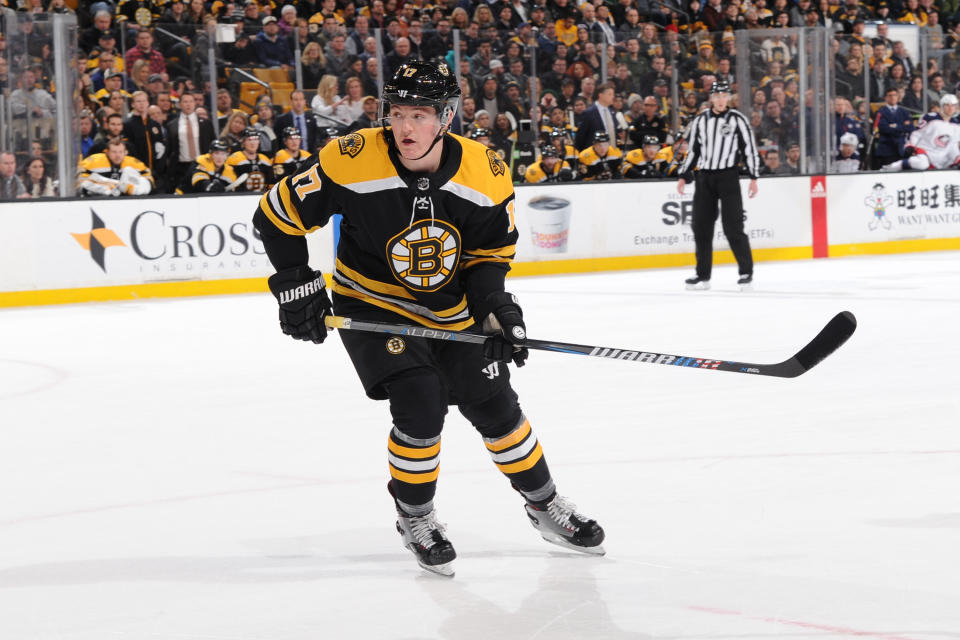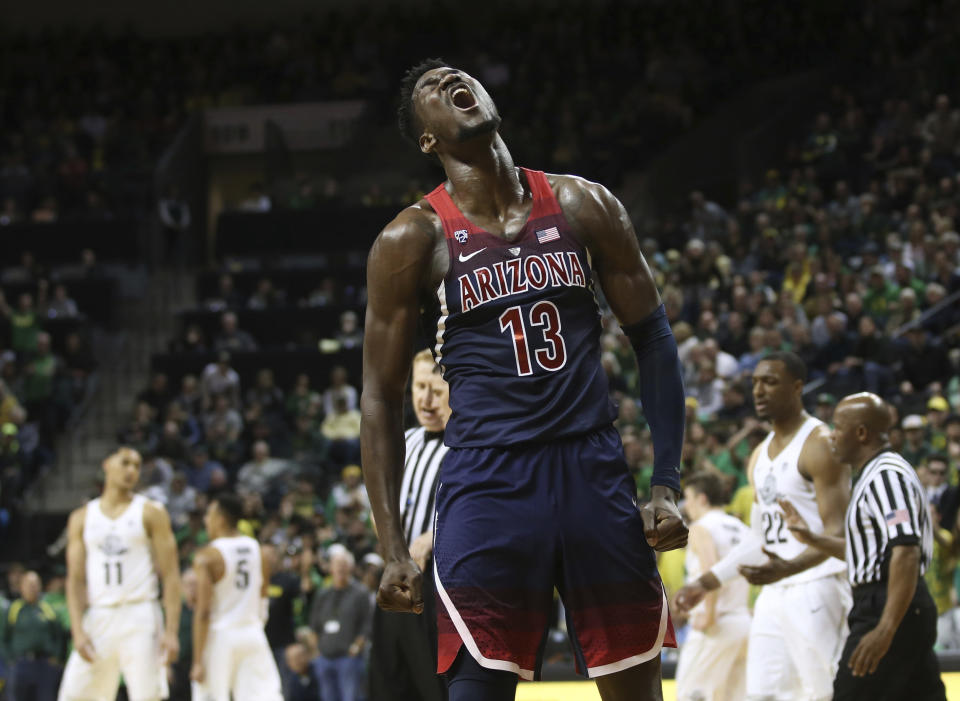College to pros in days? NHL model perhaps offers best reform solution in wake of NCAA hoops scandal

At 10:25 p.m. Friday, Ryan Donato and the Harvard hockey team had their season end with an overtime loss to Clarkston.
At 7:12 p.m. Monday, Ryan Donato took the ice for his first shift as a Boston Bruin.
From college athlete to professional athlete in just 68 hours, 47 minutes for Donato, who gave up returning for his senior season next year at Harvard to join Boston’s current chase for the Stanley Cup.
“Life moves fast,” Donato said Monday on the Bruins’ pregame show on NESN.
Fast, but not uncommon, for hockey. That’s the system. It works. It sounds bizarre when viewed in the context of basketball. Imagine, say, Deandre Ayton getting drafted in 2017, playing a year at Arizona anyway, and now that the Wildcats have been bounced from the NCAA tournament, joining the NBA team that picked him for a late season and/or playoff run.
The NCAA should consider it the standard for all of its sports and the NBA should examine it as well.
Basketball is engulfed in scandal after a sweeping federal fraud case last year led to the arrest of 10 men and rocked college athletics. It prompted the NCAA to create an independent commission chaired by former Secretary of State Condoleezza Rice to offer suggestions on reform. Likewise, the NBA is reviewing its procedures, including the elimination of the one-and-done rule for draft eligibility. The problem is age old: this is a sport that too often eats its young talent.
If nothing else, someone should address why Ryan Donato can play NCAA hockey last week and NHL hockey this week, but basketball stars can’t even dream of such a thing.
There are different rules for different sports, not merely in how the NBA and NHL do it, but even how the NCAA does it too. Not every student-athlete is treated the same.
Donato was drafted by Boston in June 2014, when he was 18. After a year of prep school and another in junior hockey, he enrolled at Harvard, where he played for his father, Ted. The Bruins retained Donato’s rights all along. Meanwhile, NCAA rules allow drafted hockey players to maintain their college eligibility as long as they haven’t signed a contract.
Additionally, hockey players are allowed to retain a sports agent to negotiate with a professional team as long they don’t receive anything of benefit from the agent – other than the valuable career advice and potential contract negotiations, of course. They can’t technically sign with the agent either, but that’s distinction without a difference. If the agent gets the player a deal he finds beneficial, the player will turn pro and “hire” the agent. Otherwise, he will stay in college. It’s a handshake agreement, not a written one. (Baseball players enjoy similar freedoms, courtesy of both MLB and the NCAA.)

Donato, who turns 22 next month, played three seasons at Harvard, including a star turn this winter with the U.S. Olympic team. Then he decided to head to the NHL. He signed a two-year, entry-level deal with Boston on Sunday.
In contrast, the NBA requires amateur players to declare themselves eligible for the draft. The NHL doesn’t – everyone over 18 is available to be drafted.
Then the NCAA comes in. By declaring for the draft (athletes have until 10 days before the NBA draft – June 11 – to back out), NCAA rules state that a basketball player loses his college eligibility even if he doesn’t get drafted.
As for agents, players can talk to them, but they can’t be represented in any negotiations. The professional advice hockey players are now free to enjoy is not allowed.
Why the disparity?
“Professional leagues determine the rules about their own drafts,” NCAA spokesperson Stacey Osburn said. “In the NFL and NBA, players have to deliberately submit their names to the draft, whereas in baseball and hockey, students can be drafted without formally entering into the draft process. NCAA members have taken those differences into account when considering eligibility for drafted student-athletes.”
Every athlete should be allowed the option of staying in college after being drafted. Why shouldn’t the NCAA give basketball players that benefit? Meanwhile, every student-athlete should enjoy the benefits of representation, something the NCAA is actually considering.
Donato enjoyed a system that was open, up front and honest. He knew what team wanted him. He could consult with it when plotting his and the franchise’s future. Nothing was rushed. There was a partnership to create the best for both parties, each of which is fully invested in the player’s long-term development.
He was even free to return for the 2017-18 Harvard season knowing there was a good chance exactly what did happen, would happen – he’d be in the Bruins’ lineup by mid-March. It was the best of all worlds. He didn’t give up a year of pro hockey. He gave up a few months, making the college option stronger.
Meanwhile, the Bruins got to watch a prospect develop on someone else’s dime while marketing himself through college and Olympic hockey. His long-awaited debut Monday was big news in Boston. A year ago, the Bruins enjoyed a similar spark when Boston University star Charlie McAvoy joined them after the NCAA tourney. His first game was in the NHL playoffs, no less.
Could this work in basketball? Absolutely.
Right now, other than for the obvious lottery picks, entering the NBA draft is a leap into the darkness. It comes after myriad voices offer contrasting and often confusing advice on whether to go or stay. Different potential agents say different things. College coaches have their own motivations. A player’s support system, as the FBI scandal shows, is ripe to be bought off.
Instead, you could have a high school or college player officially represented by an attorney and get drafted by, say, San Antonio. He would then sit down with Gregg Popovich and determine a plan. Come join the team now. Head to the developmental G League. Go pursue college hoops. It’s all good.
It’s also how NBA teams deal with international prospects, who routinely stay in Europe after being drafted. Why can’t American basketball players enjoy the same beneficial system?
Partially in response to the scandal, the NBA appears ready to eliminate the one-and-done rule and begin drafting high school players again. That will help ease some corruption because it frees the best players from draconian NCAA rules. It will also make the NBA even younger while hurting the talent level of college basketball.
While the NBA talks of bulking up the G League, it also knows the value of having players become stars via March Madness. In an open system, players could be drafted on potential, especially in the second round, without having to give up all their options as a young adult, including a college education.
Then there is the guy who slips through the draft without getting picked. Why kick him out of the NCAA just because he tried? If this means million-dollar college coaches have to work harder to manage their rosters through the uncertainty, oh well. Mike Krzyzewski and John Calipari will adjust.
This is the clean and crisp way of doing things. Nothing is perfect and this shouldn’t be the full extent of the reform, but it’s better than the current system. Put it this way, neither the NHL nor MLB are looking to follow basketball’s convoluted model.
It also isn’t some theory that needs to be tested. It’s been in practice for years. The NHL isn’t as big of a business as the NBA, but it’s still big business. Donato was one of about 190 NHL draft picks playing college hockey this winter – a number that includes 10 first-round picks.
It’s working fine. There are minimal problems.
By respecting Ryan Donato, rather than limiting him, the sport of hockey allowed a kid to go seamlessly from Harvard last week to the Bruins this one.
He had a goal and two assists in his debut.
More from Yahoo Sports:
• NFL mock draft 2.0: It’s all about the QBs
• Did NBA prospect hurt himself with tourney dud?
• President Trump makes it harder for MLB teams to trade
• Chris Mannix: Led by Lillard, red-hot Blazers look like real deal
